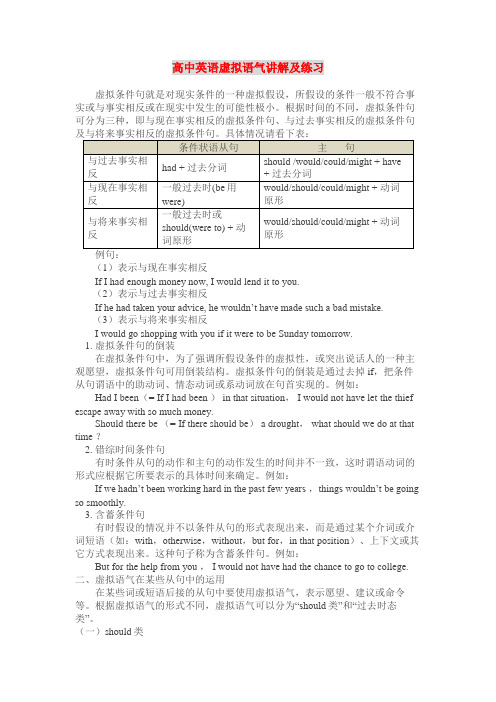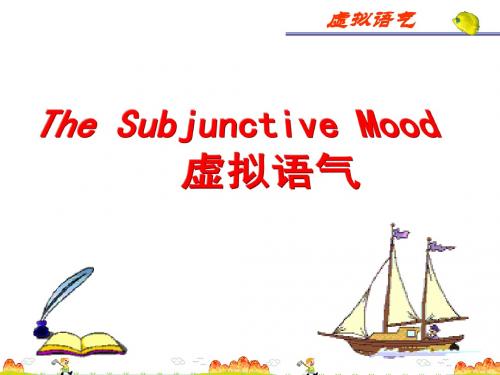虚拟语气专题讲解
高中英语语法(虚拟语气)

Unit13虚拟语气专题讲解【知识要点】语气(mood)是一种动词形式,用以表示说话者的意图或态度。
英语有三种语气:*直陈语气(indicative mood)---- 事实France lies to the east of England.*祈使语气(imperative mood)---- 请求、命令Make yourself at home.*虚拟语气(subjunctive mood)If there were no air and water , we should not be able to live on the earth.虚拟语气表示说话人的一种主观愿望或假想,所说的是一个条件而不一定是事实,或与事实相反。
一. 虚拟语气在if条件状语从句中的用法假设类型条件从句谓语动词形式主语谓语动词形式与现在事实相反动词的过去式(be用were而不用was) should/ would /could/ might+动词原形与过去事实相反had + 过去分词should/ would/could /might + have+过去分词与将来事实相反1.should+动词原形2.动词过去式3.were to+动词原形should/ would/ could/ might +动词原形1. 在错综条件句子中,虚拟条件从句和主句动作发生的时间不一致,因此,主句和从句的谓语动词应根据所指的时间选用适当的虚拟语气形式。
1)If I were you,I wouldn't have missed the film last night.2)If he had followed the doctor's advice,he would recover already.(从句与过去事实相反,主句与现在事实相反。
)2、在if虚拟条件句中,有时可把连词省去,采用倒装语序把谓语动词were或助动词did,had,should 移到句首构成非真实条件从句的另一种句型,其意思不变。
高中英语虚拟语气讲解及练习题(附答案)

高中英语虚拟语气讲解及练习虚拟条件句就是对现实条件的一种虚拟假设,所假设的条件一般不符合事实或与事实相反或在现实中发生的可能性极小。
根据时间的不同,虚拟条件句可分为三种,即与现在事实相反的虚拟条件句、与过去事实相反的虚拟条件句(1)表示与现在事实相反If I had enough money now, I would lend it to you.(2)表示与过去事实相反If he had taken your advice, he wouldn’t have made such a bad mistake.(3)表示与将来事实相反I would go shopping with you if it were to be Sunday tomorrow.1. 虚拟条件句的倒装在虚拟条件句中,为了强调所假设条件的虚拟性,或突出说话人的一种主观愿望,虚拟条件句可用倒装结构。
虚拟条件句的倒装是通过去掉if,把条件从句谓语中的助动词、情态动词或系动词放在句首实现的。
例如:Had I been(= If I had been ) in that situation, I would not have let the thief escape away with so much money.Should there be (= If there should be) a drought, what should we do at that time ?2. 错综时间条件句有时条件从句的动作和主句的动作发生的时间并不一致,这时谓语动词的形式应根据它所要表示的具体时间来确定。
例如:If we hadn’t been working hard in the past few years ,thing s wouldn’t be going so smoothly.3. 含蓄条件句有时假设的情况并不以条件从句的形式表现出来,而是通过某个介词或介词短语(如:with,otherwise,without,but for,in that position)、上下文或其它方式表现出来。
(完整版)虚拟语气倒装(讲解+练习)

虚拟语气有些条件句是可能实现的,称为真实条件句. 虚拟语气是动词的一种特殊形式,用来表达说话人的意愿.请求,设想,等未能或不可能实现的事实,或说话人看来实现可能性很小的情况.做这类题时首先要弄清楚虚拟语气的各种句型,即由if引导的虚拟条件句,省略if的倒装形式,可跟虚拟语气的宾语从句,同位语从句,表语从句的句型,以及表示祝愿或感叹的句子和由without, but for等介词引导的短语或句子.主要用法1). 主语从句,同位语从句中虚拟语气的用法.2). 宾语从句中虚拟语气的用法,尤其是wish 虚拟语气结构的用法.3). If条件句中虚拟语气的用法,应特别注意省略if的倒装结构是考试的重点.4). would rather(=wish)等结构中虚拟语气的用法.5). if only(如果。
就好了)结构中虚拟语气的用法.6). But, or, otherwise 等含蓄条件句的用法.7). It’s time (that)(早该。
)等结构中虚拟语气的用法.1. 虚拟语气在虚拟条件句中的运用(1) 虚拟语气现在时,用以表示与现在/将来事实相反的假设或现在实现可能性不大的情况.Eg. If I were a bird, I would fly to you.If it is not for their help, we shall be in a very difficult position.If it were not for their help, we should be in a very difficult position.If I had seen the film, I would…..(2) 虚拟语气过去式. 表示与过去事实完全相反的假设.Eg. If we had started earlier, we should not have missed the train.If she hadn’t been ill, she might have come.If she were not ill, she might come.◆书面语中,如果从句里含有should, had, were或其他助动词,则可将从属连词if省去,将助动词.情态动词.be或have放在句首形成部分倒装.Eg.Were he in your position,he’d do the same.If he Were in your position,he’d do the same.Had I had time, I would have done that yesterday.If I Had had time, I would have done that yesterday.If he Should (万一)come tomorrow, I should give him the dictionary.(3) 虚拟语气在某些从句中的应用.A)在(表现了说话人的愿望)wish, suggest, order, demand, propose,command, request, recommend, require, decide, insist, desire,urge等动词的宾语从句(should:应该) + 动词原形.以及would rather /sooner that后要用“ (should:应该) + 动词原形” 来表示愿望,建议,命令,要求等;由上述动词派生或转化的名词suggestion, proposal, plan,motion, recommendation, demand, order, desire, request,requirement, insistence, advice, decision , obligatory(义不容辞的,必须的同位语从句或表语从句中也要用相应的虚拟形式.Eg. His suggestion was that we (should) go at once.Wang insisted that we go at once.B)在It is/was + 某些形容词 + that (表现了说话人的愿望)从句的句型中,that从句中的谓语动词常用虚拟语气,即“should + 动词原形”这些形容词有:important, necessary, essential, imperative, natural, strange,advisable, desirable, possible, probable, astonishing,surprising, desired, suggested, requested, recommended,ordered, proposed, decided, moved等.C) “ should(居然/竟然) + 动词原形(或完成形式)” 可表示惊奇,遗憾,怀疑,不满等.ⅰ. 用于expect, believe, think, suspect 等动词的否定或疑问形式后的宾语从句中.Eg. I never expected that the new apartment should be so small.ⅱ. 用于“It is a pity, it is a shame, it is no wonder 等+ that”等结构后的主语从句中.Eg. It is a pity that he should be so careless.D) 在由for fear that, in case, lest 等引导的状语从句中,用“ should (万一)+ 动词原形” 表示“惟恐”的意思.Eg. He handled the instrument with care for fear that it should be damaged.E) 在“ It is (about/ high ) time + that (从句)(早就应该)” 中,谓语动词常用过去式表表示虚拟语气.Eg. It is high time that Chinese people learnt English.F) 在“as if/ as though”(似乎/好像) 引导的状语从句中,谓语动词与wish的宾语从句的虚拟形式相同.Eg. He w ork s with such enthusiasm as if he never knew fatigue. He speaks English as though he were an American.G) 在 look/sound/feel/ seem + as if / as though从句中,当表示真实情况时,用陈述语气; 否则,用虚拟语气.Eg.It seems as if they know each other. (真实情况)It seems as if they knew each other.It seems as though it were already spring. (虚拟语气)H) 用在if only(如果。
高中英语虚拟语气讲解及练习题(附答案)

高中英语虚拟语气讲解及练习虚拟条件句就是对现实条件的一种虚拟假设,所假设的条件一般不符合事实或与事实相反或在现实中发生的可能性极小。
根据时间的不同,虚拟条件句可分为三种,即与现在事实相反的虚拟条件句、与过去事实相反的虚拟条件句(1)表示与现在事实相反If I had enough money now, I would lend it to you.(2)表示与过去事实相反If he had taken your advice, he wouldn’t have made such a bad mistake.(3)表示与将来事实相反I would go shopping with you if it were to be Sunday tomorrow.1. 虚拟条件句的倒装在虚拟条件句中,为了强调所假设条件的虚拟性,或突出说话人的一种主观愿望,虚拟条件句可用倒装结构。
虚拟条件句的倒装是通过去掉if,把条件从句谓语中的助动词、情态动词或系动词放在句首实现的。
例如:Had I been(= If I had been ) in that situation, I would not have let the thief escape away with so much money.Should there be (= If there should be) a drought, what should we do at that time ?2. 错综时间条件句有时条件从句的动作和主句的动作发生的时间并不一致,这时谓语动词的形式应根据它所要表示的具体时间来确定。
例如:If we hadn’t been working hard in the past few years ,thing s wouldn’t be going so smoothly.3. 含蓄条件句有时假设的情况并不以条件从句的形式表现出来,而是通过某个介词或介词短语(如:with,otherwise,without,but for,in that position)、上下文或其它方式表现出来。
虚拟语气讲解

虚拟语气
3、条件从句与将来事实不一致,句型为:
If主语+过去式/should/were to+do,主语+
would ,could…+ 原形 do,如:
If it should rain tomorrow, we would stay at
home.
If I were to go to the moon one day, I could see
My idea is that we (should ) think it over before accepting it. My suggestion that we (should) have a meeting has been accepted by others. We all agree to that suggestion that the meeting (should) be put off.
I wish (that) I would\could go.
B)用于表示坚持,命令、建议、要求等一类词后面的宾
语从句。
We suggested that the meeting (should) be put off. They insisted that the boy (should) go with them. 注意:suggest 当表示“暗示、表明”讲时,insist 表 示“坚持认为,坚持说” 时,应用陈述语气。 The smile on his face suggested that he was satisfied with our work.
虚拟语气
虚拟语气
语气
英语的动词一般可带有三种不同的语气:
陈述语气,祈使语气和虚拟语气。
初中虚拟语气讲解及专项练习与答案(带解析)

虚拟语气讲解语气(mood) 是一种动词形式,用以表示说话者的意图或态度。
英语中的语气有三种:陈述语气、祈使语气和虚拟语气。
直陈语气(indicative mood),表示所说的话是事实。
祈使语气(imperative mood),表示所说的话是请求或命令。
虚拟语气(subjunctive mood),表示说的话不是事实,或者是不可能发生的情况,而是一种愿望、建议或与事实相反的假设等。
一. 虚拟语气在条件句中的应用学习虚拟语气在条件句中的用法之前我们必须清楚条件句的种类:条件句有真实条件句与非真实条件句(或称虚拟条件句)两种。
真实条件句所表的假设是可能发生或实现的,句中的条件从句与结果主句都用陈述语气。
如:If it doesn’t rain tomorrow, I will go for a picnic. 假若明天不下雨,我就去野餐。
Oil floats if you pour it on water. 你如把油倒在水里,油就浮起来。
虚拟条件句所表的假设则是不可能或不大可能发生或实现的,句中的条件从句与结果主句皆须用虚拟语气。
条件从句主句与现在事实相反If 主语+动词过去式(be的过去式用were)should (would, might,could)+动词原形与过去事实相反If 主语+had+过去分词should (would, might,could)+ have +过去分词与将来事实可能相反If 主语+动词过去式(be的过去式用were);should+动词原形;were to+动词原形should (would, might,could)+动词原形1. 与现在事实相反的虚拟条件句,条件从句的谓语用动词的过去式(be的过去式用were), 主句的谓语用should (would, might,could)+动词原形。
如:If it were not raining, we should go for a picnic.如果现在不下雨的话,我们就出去野餐了。
高中虚拟语气的讲解+练习+详解
高中英语虚拟语气讲解及练习虚拟条件句就是对现实条件的一种虚拟假设,所假设的条件一般不符合事实或与事实相反或在现实中发生的可能性极小。
根据时间的不同,虚拟条件句可分为三种,即与现在事实相反的虚拟条件句、与过去事实相反的虚拟条件句(1)表示与现在事实相反If I had enough money now, I would lend it to you.(2)表示与过去事实相反If he had taken your advice, he wouldn’t have made such a bad mistake.(3)表示与将来事实相反I would go shopping with you if it were to be Sunday tomorrow.1. 虚拟条件句的倒装在虚拟条件句中,为了强调所假设条件的虚拟性,或突出说话人的一种主观愿望,虚拟条件句可用倒装结构。
虚拟条件句的倒装是通过去掉if,把条件从句谓语中的助动词、情态动词或系动词放在句首实现的。
例如:Had I been(= If I had been ) in that situation, I would not have let the thief escape away with so much money.Should there be (= If there should be) a drought, what should we do at that time ?2. 错综时间条件句有时条件从句的动作和主句的动作发生的时间并不一致,这时谓语动词的形式应根据它所要表示的具体时间来确定。
例如:If we hadn’t been working hard in the past few years ,thing s wouldn’t be going so smoothly.3. 含蓄条件句有时假设的情况并不以条件从句的形式表现出来,而是通过某个介词或介词短语(如:with,otherwise,without,but for,in that position)、上下文或其它方式表现出来。
虚拟语气用法讲解及练习
虚拟语气用法归纳英语的动词一般可带有三种不同的语气:陈述语气,祈使语气和虚拟语气。
不同的语气用动词的不同形式(或句法形式)来表示。
一、虚拟条件句条件句有两类:一类是真实条件句,一类是虚拟条件句如果假设的情况是有可能发生的,就是真实条件句,谓语用陈述语气。
If you don’t work hard, you will fail.如果你不努力,就会失败。
If it is fine tomorrow, we will go for a picnic.如果明天天气好,我们就去野餐。
如果假设的情况过去、现在、将来都不存在,或者可能性极小,则为虚拟语气虚拟条件句和对应主句的动词形式列表:1.与现在事实相反的虚拟What would you do if you won the lottery?假如你中了彩票,你会做什么?If I were you, I would seize the chance to go abroad. 如果我是你,我会抓住这次出国的机会。
If I had a lot of money now, I would travel around the world.假如我现在有很多钱,我会环游世界,2.与过去事实相反的虚拟If you had been here yesterday, you would have seen her.如果昨天你在这里,就会见到她了。
If he had driven more carefully, he would not have had the car accident yesterday.如果他小心驾驶的话,昨天就不会出事故了。
3. 与将来事实相反的虚拟If it were to rain/should rain/rained tomorrow, our plan would be put off.假如明天下雨,我们的计划才可能推迟。
(下雨的可能性很小)If we were to picnic, we would not be able to help.如果到时候我们去野餐,就没办法帮忙了。
虚拟语气详细讲解
• God save his soul. • 上帝保佑他的灵魂得到安息。
• Far be it from me to accept his advice blindly. 我决不会盲目接受他的意见。
• 形容词主要有: advisable,desirable,appropriate,essential,fitting, important,imperative,impossible,necessary,obligatory, proper,vital,urgent等
• 用于表示祝愿、诅咒、假定、让步、担忧等 含义的结构和一些固定用法中。
• 倘若早将他的建议付诸实施,情况早就完全 不同了。
• If it hadn’t rained so heavily I would surely have come to your meeting on Friday afternoon.
• 倘若不是天下大雨,我一定会来出席你们星 期五下午召开的会议。
虚拟语气详细讲解
•
英 语 语 法 构 成 示 意 图
• 简单的简单句
• 六个最基本句型,以与其中包含的六种句子成分(主 谓宾系表补)。
• ①SV(主谓) • ②SVO(主谓宾) • ③SVP(主系表) • ④SVOOC(主谓宾宾补) • ⑤SVIODO(主谓双宾语) • ⑥There be + O (There be)
1.2 be型虚拟语气
• Be型虚拟语气指在任何情况下,不分时态、 人称,句子谓语动词统统使用原形动词的 虚拟形式,be型虚拟语气主要有两种用途
虚拟语气讲解及练习题(含答案和解释)
高中英语虚拟语气讲解及练习虚拟条件句就是对现实条件的一种虚拟假设,所假设的条件一般不符合事实或与事实相反或在现实中发生的可能性极小。
根据时间的不同,虚拟条件句可分为三种,即与现在事实相反的虚拟条件句、与过去事实相反的虚拟条件句(1)表示与现在事实相反If I had enough money now, I would lend it to you.(2)表示与过去事实相反If he had taken your advice, he wouldn’t have made such a bad mistake.(3)表示与将来事实相反I would go shopping with you if it were to be Sunday tomorrow.1. 虚拟条件句的倒装在虚拟条件句中,为了强调所假设条件的虚拟性,或突出说话人的一种主观愿望,虚拟条件句可用倒装结构。
虚拟条件句的倒装是通过去掉if,把条件从句谓语中的助动词、情态动词或系动词放在句首实现的。
例如:Had I been(= If I had been ) in that situation, I would not have let the thief escape away with so much money.Should there be (= If there should be) a drought, what should we do at that time ?2. 错综时间条件句有时条件从句的动作和主句的动作发生的时间并不一致,这时谓语动词的形式应根据它所要表示的具体时间来确定。
例如:If we hadn’t been working hard in the past few years ,thing s wouldn’t be going so smoothly.3. 含蓄条件句有时假设的情况并不以条件从句的形式表现出来,而是通过某个介词或介词短语(如:with,otherwise,without,but for,in that position)、上下文或其它方式表现出来。
- 1、下载文档前请自行甄别文档内容的完整性,平台不提供额外的编辑、内容补充、找答案等附加服务。
- 2、"仅部分预览"的文档,不可在线预览部分如存在完整性等问题,可反馈申请退款(可完整预览的文档不适用该条件!)。
- 3、如文档侵犯您的权益,请联系客服反馈,我们会尽快为您处理(人工客服工作时间:9:00-18:30)。
虚拟语气专题讲解 一.概念 虚拟语气是谓语动词的一种特殊形式,用来表达假设、主观愿望、猜测、建议、可能或空想等非真实情况;(非虚拟就是接近于客观事实的情况) 二.虚拟语气分为两大类: 时态后退型(虚拟语气不可能出现现在的时态,一律是过去相关或相对应的时态)和should+ V原型 三.虚拟语气在复合句中的用法结构框架 类别 用法 例句
If引导的条件从句 与现在事实相反 从句动词:过去式(be用were) 主句动词:would/should/could/might+动词原形 If he were here, he would help us. 与过去事实相反 从句动词:had+过去分词 主句动词:should/would/could/might+have+过去分词 If I had been free, I would have visited you.
与将来事实相反 从句动词:过去式 / should+动词原形 / were+不定式 主句动词:should/would/could/might+动词原形
If it should rain tomorrow, we would not go camping.
If…not… =but for 与现在事实相反 If it were not for…, sb would/should/could/might+V原形 If it were not for water, human couldn’t live on the earth. 与过去事实相反 If it had not been for… , sb would/should/could/might +have done If it had not been for your help, we couldn’t have finished the task.
其它状语从句
as if引导的状语从句中动词用过去式或过去完成式 They are talking as if they had been friends for years.
in order that / so that引导的状语从句中动词用can / could / may / might / would等+动词原形
Turn on the light so
that we can see it clearly.
宾语从句 demand, suggest(建议), order, insist(坚持要求)后接的从句中动词为should+动词原形;suggest暗示,insist坚持认为,为陈述句语气;
He suggested that we
not change our mind.
wish后的从句中分别用过去式,过去完成式和should/would+动词原形表示与现在,过去和将来情况相反
I wish I could be a pop singer. 表语从句和同位语从句
在suggestion, proposal, request, requirement, advice等名词后的表语从句、同位语从句中,谓语用“(should) do”形式
(1)My suggestion is that we (should) send a few comrades to help the other groups (2)He gave an order that the work be done at once.
主语从句 在It is necessary / important / strange that…, It is suggested / demanded / ordered / requested that… 等从句中,谓语动词用should+动词原形
It is strange that such a person should be our friends.
其它句型中 It is time that…句型中动词用过去式或should+动词原形 It’s high time that we left. would rather所接的从句中动词用过去式或者过去完成式 I would rather you
stayed at home now. If only句型中动词常用过去式或者过去完成式,表示强烈的愿望 If only our dream
had come true!
巩固练习:If的巩固 (2011年) 75.If_________(我没有喝)alcohol last night. I could have driven my car home.(drink) If __________________________(万一你被解雇), your health care and other benefits will not be immediately cut off.(fire) 如果我是你,我会再试一次。____________________________.(if) 关于If虚拟语气的三种变化需注意:倒装虚拟语气,混时虚拟语气,含蓄虚拟语气。 (1)倒装虚拟语气变化 如果条件句中有were, had, should 等助动词,可将if省略,而把were, had或should 置于句首,来表达以if引导的条件句的相同意思。 Should it rain/were it to rain tomorrow, the sports meet would be put off. Had he seen you yesterday, he would have returned your book.
巩固练习: (2011年)75. Had we not used an out-of-date train schedule, we ________ the train. (miss) 要不是用了一张过期的列车时刻表,我们就不会误了火车。 Were_______________________ tomorrow, we wouldn’t go out.(snow) 要是明天下雪的话,我们就不出去。 (2)混时虚拟语气变化 条件句与主句的动作发生的时间有先后之差,应按各自动作时间搭配好相应的结构形式。 例如:If I had followed the doctor’s advice then, I would be feeling better now. If you had reviewed the lesson, you would answer the question now. 巩固练习: If you ________ the bus, we ________ the wonderful film in the cinema now. A. don't miss; are enjoying B. didn't miss; are enjoying C. had not missed; would be enjoying D. had not missed; were enjoying I ______ a doctor now if I _______ medical science when I was at university. A. were; studied B. would be; had studied C. had been; had studied D. Would have been; studied If the weather had been more favorable , the crop___________________(会长得更好)now.
(grow) (3)含蓄虚拟条件句: 句中没有明显的虚拟条件句,而是利用其它条件暗示存在的条件句,这类隐含虚拟条件句的手段有:with,without,but for(=If it…not for…), or, otherwise, but。 But for the help of my English teacher, I_________ the first prize in the English Writing Competition. (win) 要不是我的英语老师的帮助,我在英语竞赛中得不了一等奖。 With a little more care you ____________________(能避免) this traffic accident. (avoid) 巩固练习: 1. Had it not been for the heavy fog , you ___________________________(就看到了美丽的塔)
in the distance easily last Tuesday. (see) 2. Were _______________________(下雨)tomorrow, the meeting would be put off. (rain) 3. Mary's pale face suggested that she _____ (病了)ill and I suggested that she ______(看医生)a doctor. 4. What a pity!We _______________(宁愿听取) our teacher’s advice yesterday. (would rather) 5. He hesitated for a moment before kicking the ball, otherwise he ______________ a goal.(score) 他踢球之后犹豫了片刻,要不然的话他就进球了。 6. When the police took the suspect to the police station, he insisted that he_______________
______ (没偷) the lady’s purse and that he___________________________ (释放). (steal, set) 7. I feel so sick. I wish Mum__________________(没有逼我) to eat so much.(force) 8. The workers in the factory demanded that their pay _________________(提高20%). (raise) 9. When a pencil is partly in a glass of water, it looks as if it _________________(断了). (break)
